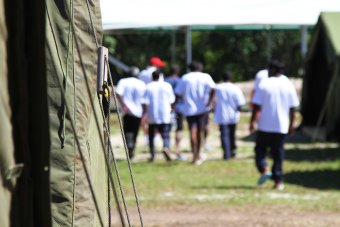Refugee advocates warn of mental health risks for unaccompanied children sent to Nauru
Posted
Refugee advocates say the Government's decision to send 10 unaccompanied children to a detention centre on Nauru has put the children at serious risk of mental health issues.
Advocates from Save the Children, the charity employed to look after the children, say the minors arrived on Sunday morning and will be held in a detention centre that houses family groups.
Save the Children says research shows the longer the children are kept in detention the more it impacts their physical wellbeing and mental health.
The organisation's director of international programs, Scott Gilbert, says the Government should have never sent the children into offshore detention.
"We do not think, under any circumstances, that children as vulnerable as these should be sent offshore for processing, as it's called," he said.
"We believe that the best place for these children is in the Australian community where they get the support and the standard of care and services that they require - and that still remains our very, very strong position."
Immigration Minister Scott Morrison has stood by the Government's policy of placing children in offshore detention, and the way he carries out his responsibilities as the legal guardian of unaccompanied children.
"I do that by ensuring that the facilities are in place in Nauru and when my guardianship responsibilities are transferred to justice minister in Nauru, that's how I do it and that's what I've been doing," he said.
Mr Morrison also reiterated the Government's determination to implement the policy with no exceptions.
"You have to be consistent when pursuing policies to stop the boats and that is why we have not had a successful people smuggling venture get to Australia in the last more than eight weeks," he said.
"When people aren't coming on boats, people aren't dying on boats ... people don't have to be sent to detention centres and the extraordinary costs that are associated with all of those policies don't become necessary over the longer term.
"And so that is why we are pursuing such a consistent position on this issue. But in terms of the care of those specifically involved, that is why I've been putting the resources and the facilities in place on Nauru and that's why Save the Children are there."
Children need to have senior role models: Gilbert
Although the children will be under the supervision of Save the Children on Nauru, refugee advocates are warning their mental health is still likely to suffer.
Sophie Peer from advocacy group Chilout opposes the detention of children, and says the group is at risk of serious mental health issues.
"The biggest risk is absolutely that these children will have serious mental health issues," she said.
"As we've seen from teenagers in detention, issues of self-harm, attempted suicide and potentially worse is going to face the Australian public."
Mr Gilbert says Save the Children will work to monitor the children's safety and mental wellbeing.
He says children rely very closely on senior role models, which the organisation will try to provide for them.
"The challenge for us is really making sure that they get there safe firstly, that they're in an environment whereby they can't do harm to themselves, or others can't do harm to them," he said.
"They'll stay in the community with the other asylum seekers on Nauru, and we'll do everything we can to make sure they get access to people of different ages, and we think that's really important."
Topics: immigration, refugees, children, federal-government, mental-health, nauru, australia








